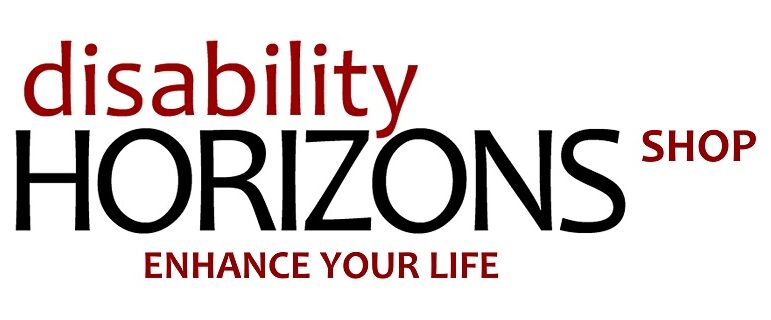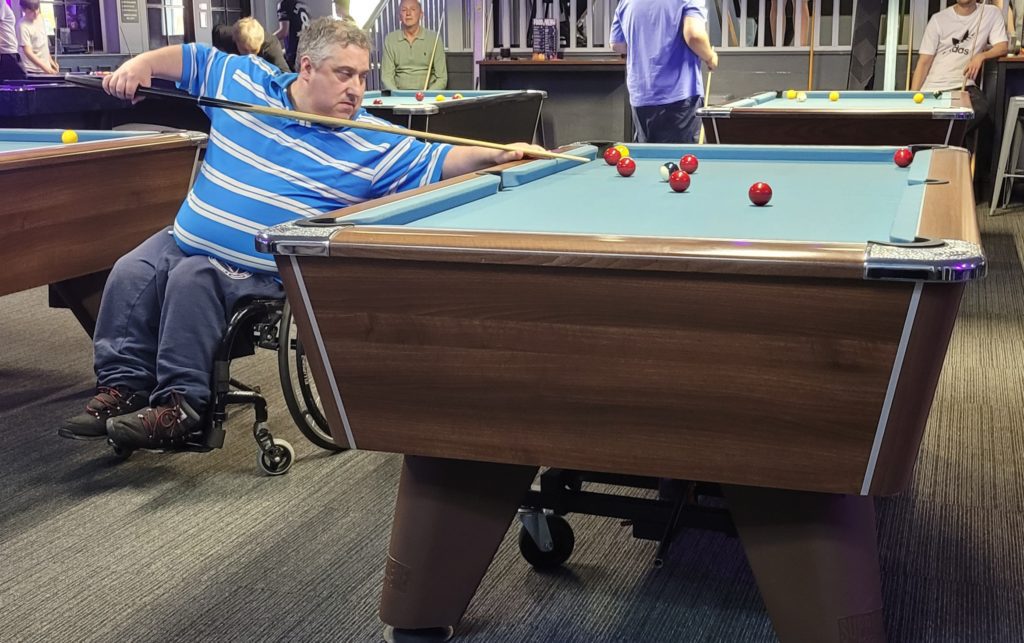One Shot at a Time: My Journey as a Wheelchair Pool Player
By Gareth Clarke
My name is Gareth Clarke, and I’m a passionate wheelchair pool player from the North West of England. What started as casual games in my nan’s local club has turned into something much bigger – trying to change how disabled players are seen and included in cue sports.
How I Got Started
I first got into pool through going to Chorlton Conservative Club where my nan worked. The locals took me under their wings and taught me how to play black ball pool rules. When I was younger I was able to stand with the aid of sticks or crutches, but now I play in my wheelchair.
It’s a completely different game from this angle. I now have to use a cushion for extra height and with being seated I use my cue rest more now. It takes longer to get round tables now as there’s not always a clear path round the table. I have to take more time to evaluate a shot due to being sat down and it being a different view due to being seated.
Training and Competition
I’ve been lucky enough to train with professional player Jimmy “The Joker” Croxton, which has really helped me up my game. I regularly participate in tournaments across the UK, often finding myself as one of the very few – sometimes the only – wheelchair players there.
When I’m not playing in a wheelchair or disability pool event I find sometimes people can underestimate your abilities. When I’ve played on a tour for either wheelchair users or one that is for all disabilities, the reception is more understanding due to players all having some understanding of disability.
The Reality of Accessibility
Most venues only have one disabled toilet, so it can be a bit of a wait when you have many people who need to use facilities. Sometimes venues have tables close together so space around the tables is hard to get around. These things affect your performance and add to the fatigue.
Building Our Own Community
After playing on a wheelchair tour for 2 seasons and meeting many people who loved playing pool, myself and a close friend Ben Norfolk started our own tour called Disabilities Assemble (join on facebook or subscribe on Youtube to view match streaming or message me). This tour is open to anyone who has a disability who loves pool and wants to have a community and a place to play pool and have an amazing time.
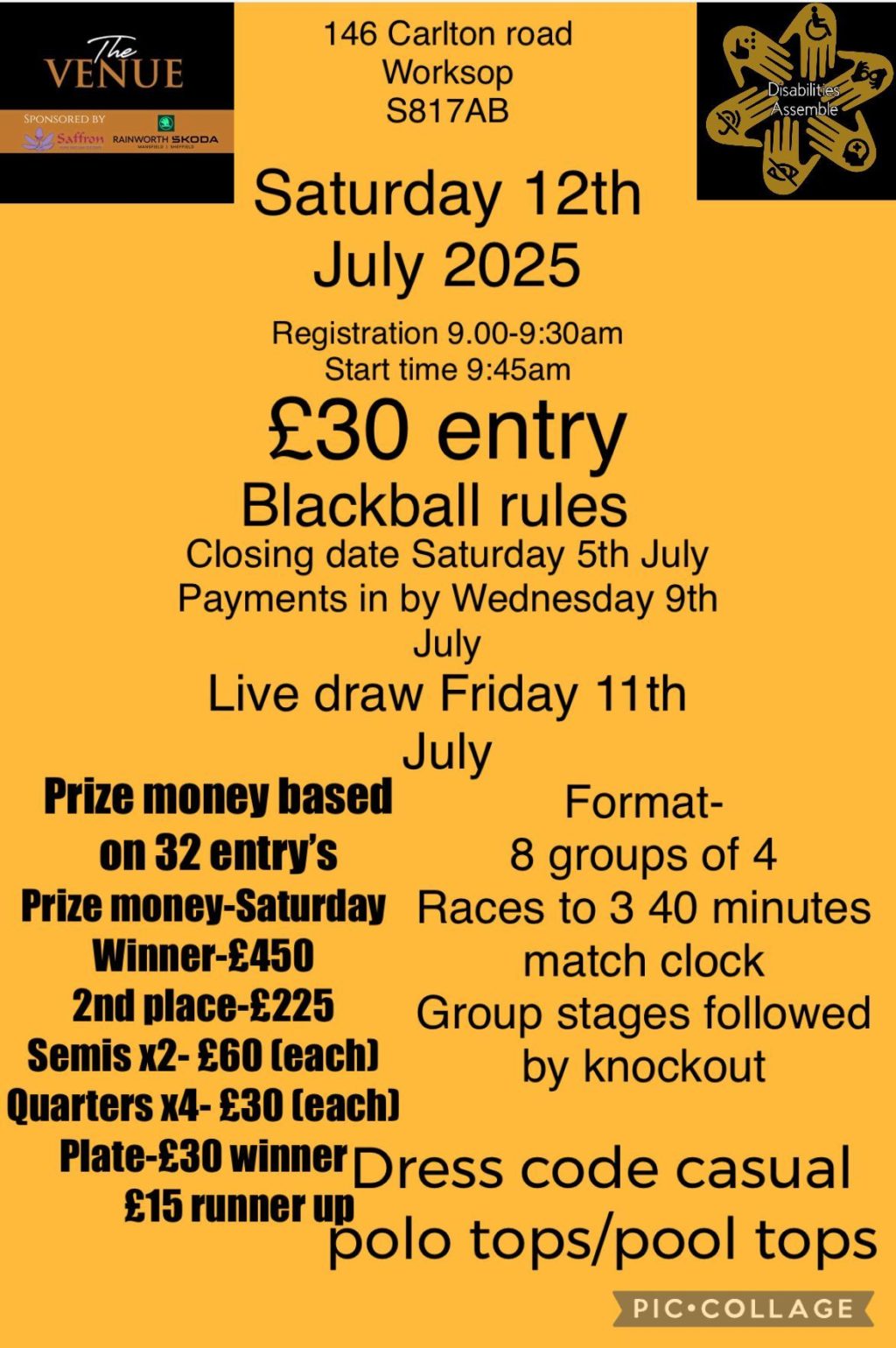
This has been well received so far. Our first event was on 17th and 18th May and we had 24 players on the 17th May and 12 players on 18th May – some did both days, others did one day. We’re about to hold our 2nd event at The Venue on Saturday 12th July with many of the players returning.
What Needs to Change
I think that out of all the cue sports, maybe snooker is more represented in the cue sports world. I’d like to see more press coverage for all disability cue sports and maybe like the Paralympics, more advertising about events beforehand.
Having more streaming of disabilities when events are on would help too, as some events don’t stream disability cue sports till the finals or sometimes the disabled cue sports aren’t streamed at all. More events advertised for disability cue sports and more events around the country too. There are some that are around the country and other countries too but you wouldn’t know unless you follow or know people in the sport. And a fairer prize fund for disabled players too, if they could encourage more sponsorship.
Editors note: For Tips for Event Organisers of Wheelchair Pool Competitions, please see the bottom of the article
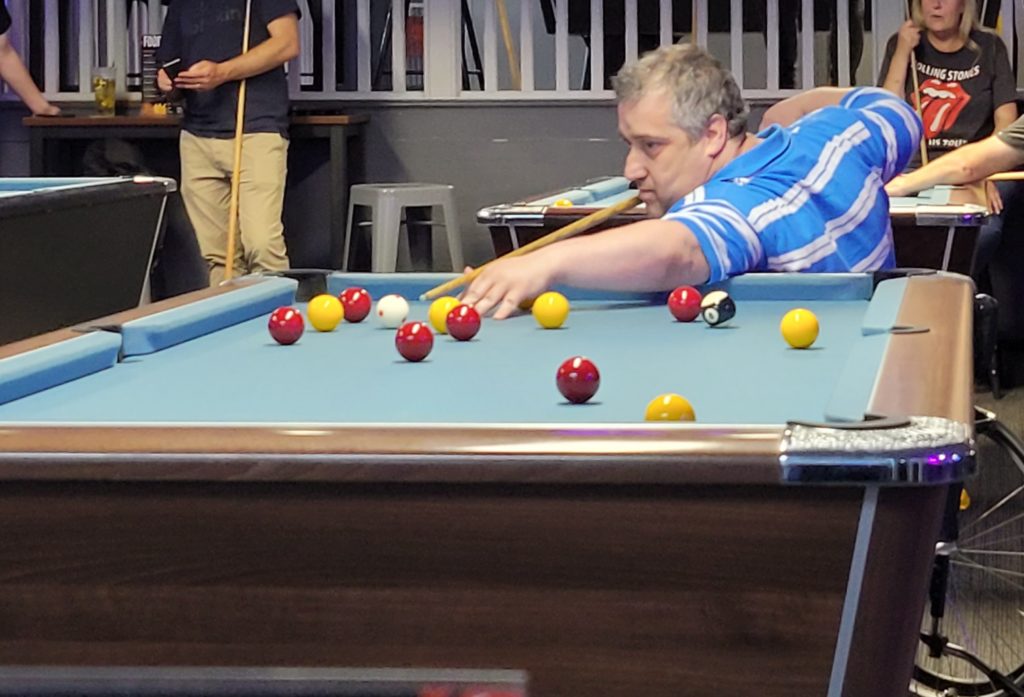
The Financial Challenge
Entry fees vary from tour to tour or event to event – I’ve paid £250 for tour fees. I’d say with tours or events, travel and accommodation costs you could easily be spending between £1500-£2500. If you’re lucky to be able to do tours in other countries, which I hope to one day, you’d be paying a lot more.
What I’m looking for with any support or sponsorship is help for me to be able to carry on entering events and travel costs. Also to be able to enter tours and events that I’ve missed out on due to funding, some of these events held outside the UK, and give me an opportunity to represent my country.
I’m lucky to have had support from someone who played in my local pool club where I play on Thursday league. He helped me with training costs and to be able to enter an event in 2024 in Blackpool where I represented my country. I have the emotional and mental support of my family and friends.
Staying Motivated – I NEVER GIVE UP!
I often find it hard on tough days to stay positive or carry on, but I live by the motto “never give up.” I try to keep going as I know that eventually my game will improve.
Many of my fellow players on the tours or events have been great at taking time out to help each other, and one of the pieces of advice I try to stick to is always play the table, not the player.
Looking Forward
I want to raise awareness and open doors for more disabled players in cue sports. Long-term, I’d love to see wheelchair users competing in all levels of the sport – and for disability to be part of the conversation, not a footnote.
Wheelchair pool is getting stronger. We’re building our own spaces where we can compete properly and actually be seen. We want recognition, we want to show what we can do, and we want the sport to be more open to anyone who wants to take part.
Get Involved
Whether you’re a brand, player, organiser, or fan – there’s room in this growing movement. Ping me a messsage, share our story, and be part of building a more inclusive future for cue sports.
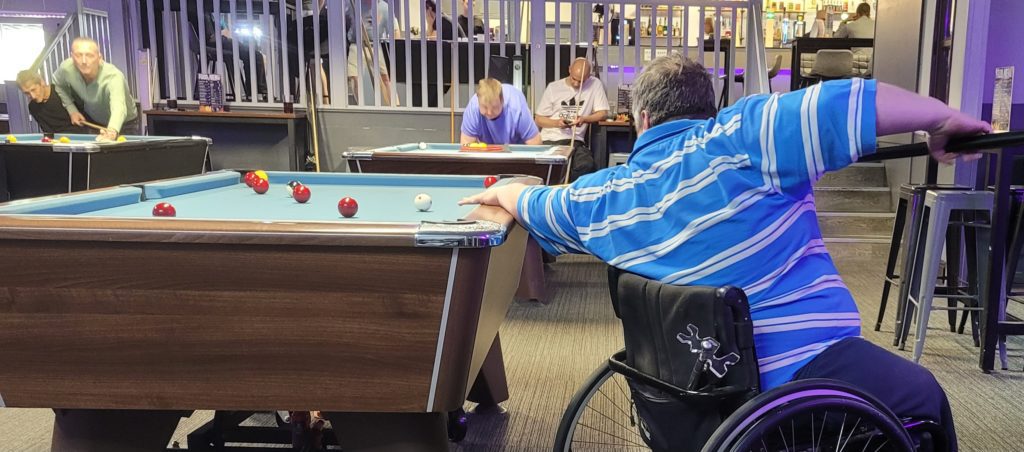
Connect with Me
I’m always looking to connect with other players, supporters, and potential sponsors who want to help grow disability cue sports. Whether you’re interested in sponsoring my journey, want to know more about Disabilities Assemble, or just fancy a chat about pool, I’d love to hear from you.
For sponsorship opportunities – I’m looking for support with travel costs, entry fees, and equipment to help me compete at more tournaments across the UK and internationally. Every bit of support helps me represent my country and show what disabled players can achieve.
Email: gareth.clarke99@outlook.com
Gareth Clarke is a competitive wheelchair pool player from the North West of England and co-founder of Disabilities Assemble, a community-focused tour for disabled cue sport athletes. He is actively seeking sponsorship to help cover travel costs and entry fees for tournaments, including international competitions where he hopes to represent his country. Please get in touch if you can help.
Resources for Wheelchair Pool/Snooker Players
United Kingdom
World Disability Billiards and Snooker (WDBS)
The official governing body for disability cue sports globally. Runs tournaments across 8 different disability categories, with Groups 1-2 specifically for wheelchair users. Offers free open days with professional coaching and is established by the World Professional Billiards and Snooker Association.
WheelPower UK
Comprehensive information on cue sports for disabled players, including classification groups and guidance on getting involved in competitive play.
Cerebral Palsy Sport – Snooker Section
Partners with WDBS on various projects and provides equipment guidance and venue information for players with cerebral palsy and other disabilities.
Disabilities Assemble
Gareth’s own community-focused tour for disabled cue sport athletes. Follow on Facebook or subscribe on YouTube for match streaming and updates.
Contact: gareth.clarke99@outlook.com
United States – Where Wheelchair Pool is Huge!
Wheelchair pool has a massive following in the USA, with one of the most developed scenes globally. The sport features organised structures, regular tournaments, and even ESPN television coverage of championships.
National Wheelchair Pool Players Association (NWPA)
The primary governing body for wheelchair billiards in the US. Sanctions 8-12 regional events annually, culminating in National Championships that have been broadcast on ESPN multiple times.
Contact: Quad7067@aol.com | Phone: 703-817-1215
American Poolplayers Association (APA) Wheelchair Championship
Held annually in conjunction with APA Poolplayer Championships at Westgate Las Vegas. This well-established tournament accepts up to 64 players with entry fees of $100. Eligibility requires at least 10% loss of function of lower limbs.
Paralyzed Veterans of America (PVA)
Works directly with NWPA as the national governing body, providing support and resources specifically for veteran wheelchair players.
International Resources
World Professional Billiards and Snooker Association
The parent organisation that established WDBS, ensuring disability cue sports maintain professional standards globally.
Getting Started
Whether you’re in the UK, USA, or anywhere else in the world, these organisations can help you:
- Find local tournaments and events
- Connect with other wheelchair players
- Access professional coaching
- Understand classification systems
- Get equipment recommendations
The wheelchair pool community is growing stronger every year, with the USA leading the way in terms of organisation, media coverage, and competitive opportunities. But as Gareth’s story shows, passionate players everywhere are working to build inclusive communities and create more opportunities for disabled athletes to compete and excel.
Want to add a resource or update information? Contact editor@disabilityhorizons.com
Tips for Event Organisers
If you’re organising tournaments and want to make them more accessible for disabled players, here’s what would really help:
For Wheelchair Users and Mobility Issues:
- Make sure there’s proper spacing between tables so wheelchair users can get around freely
- Allow players to bring cushions or equipment they need
- Remember we need more time to evaluate shots and move around – factor that into your schedule
- If possible, have more than one accessible toilet – one for the whole venue makes things difficult
- Accessible parking close to the entrance would be brilliant
For Players with Visual Impairments:
- Good lighting around all tables is essential
- Clear contrast between balls and table felt
- Audio announcements for scores and results
For Players with Hearing Impairments:
- Use visual signals instead of just audio announcements
- Have clear written instructions and schedules available
- Consider sign language interpreters for bigger events
For All Disabilities:
- Remember not all disabilities are visible – be understanding and flexible
- Have quiet areas available for breaks
- Train your staff in disability awareness
- Make sure there are clear pathways around the playing area
- Simple, clear signage throughout the venue
Coverage and Promotion:
- Stream disability events with the same quality as other competitions, not just the finals
- Advertise disability events properly – not just within disability sports networks
- Fair prize funds for disabled players would go a long way
These changes would make such a difference to how we can all perform and enjoy competing,
